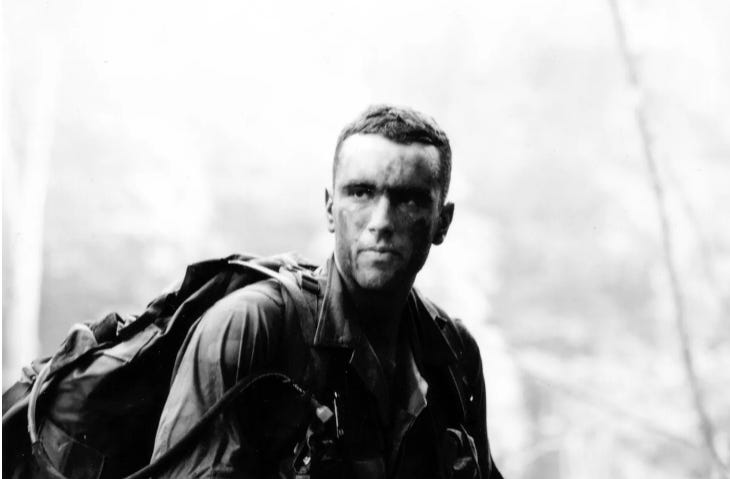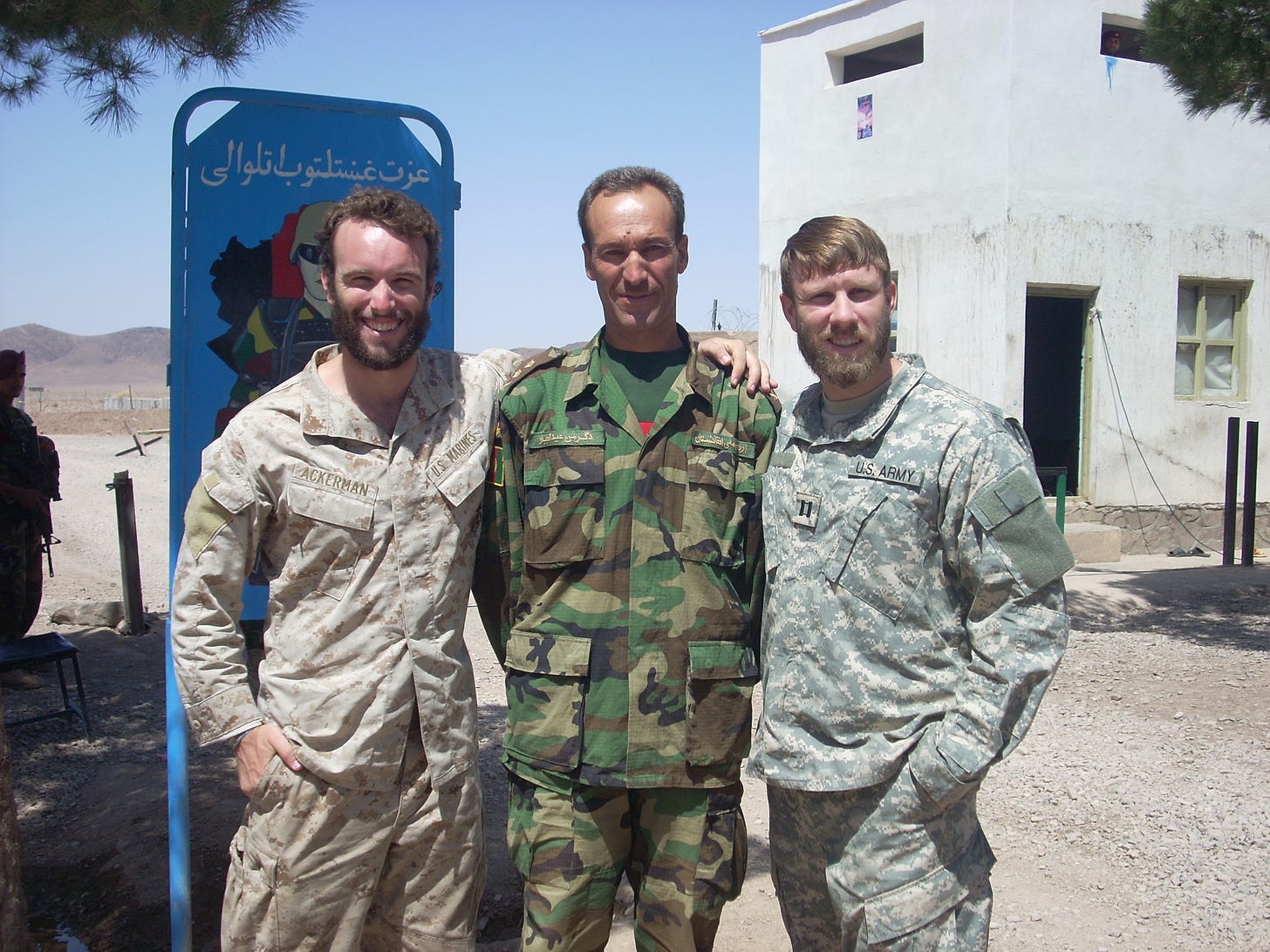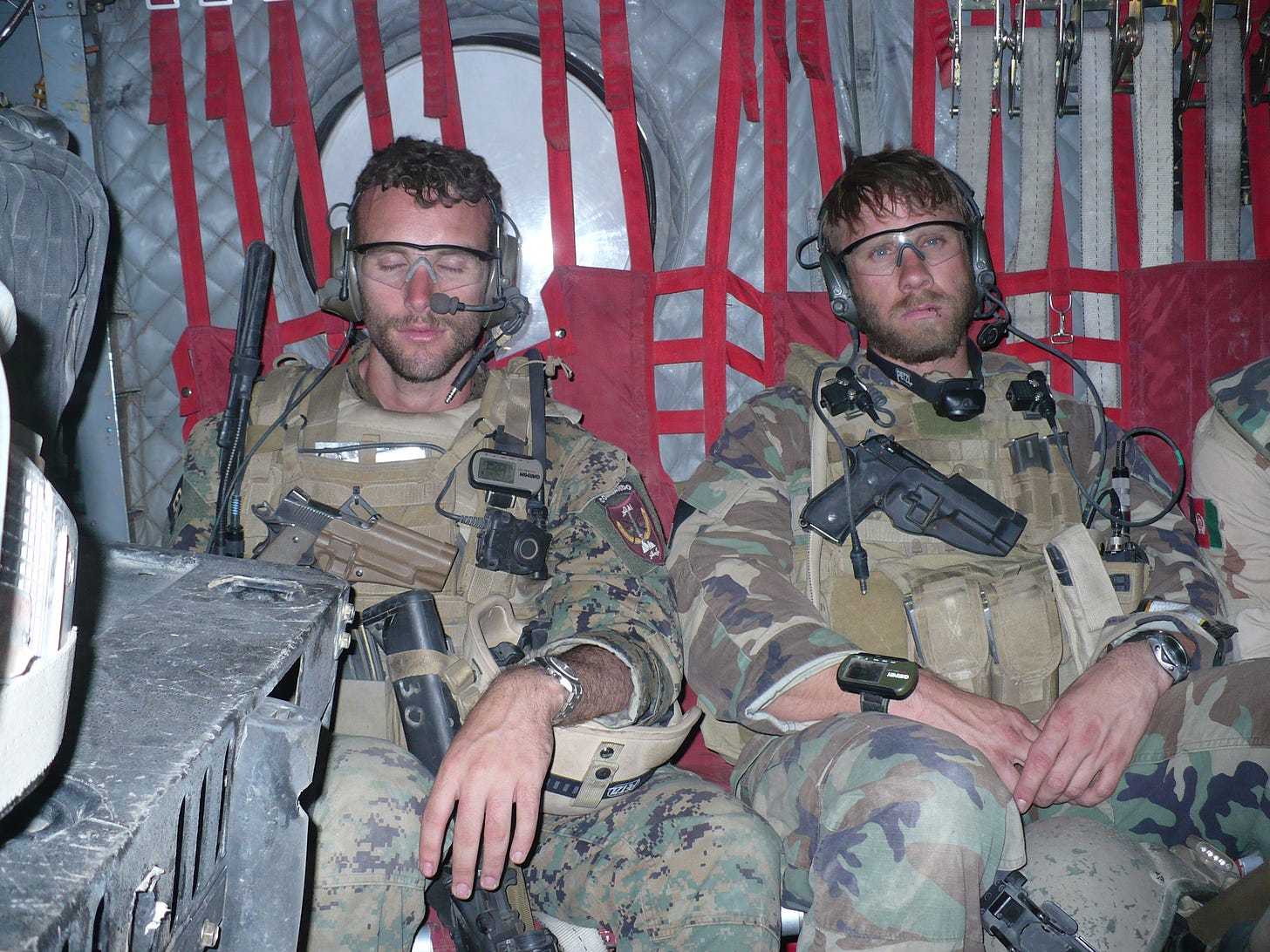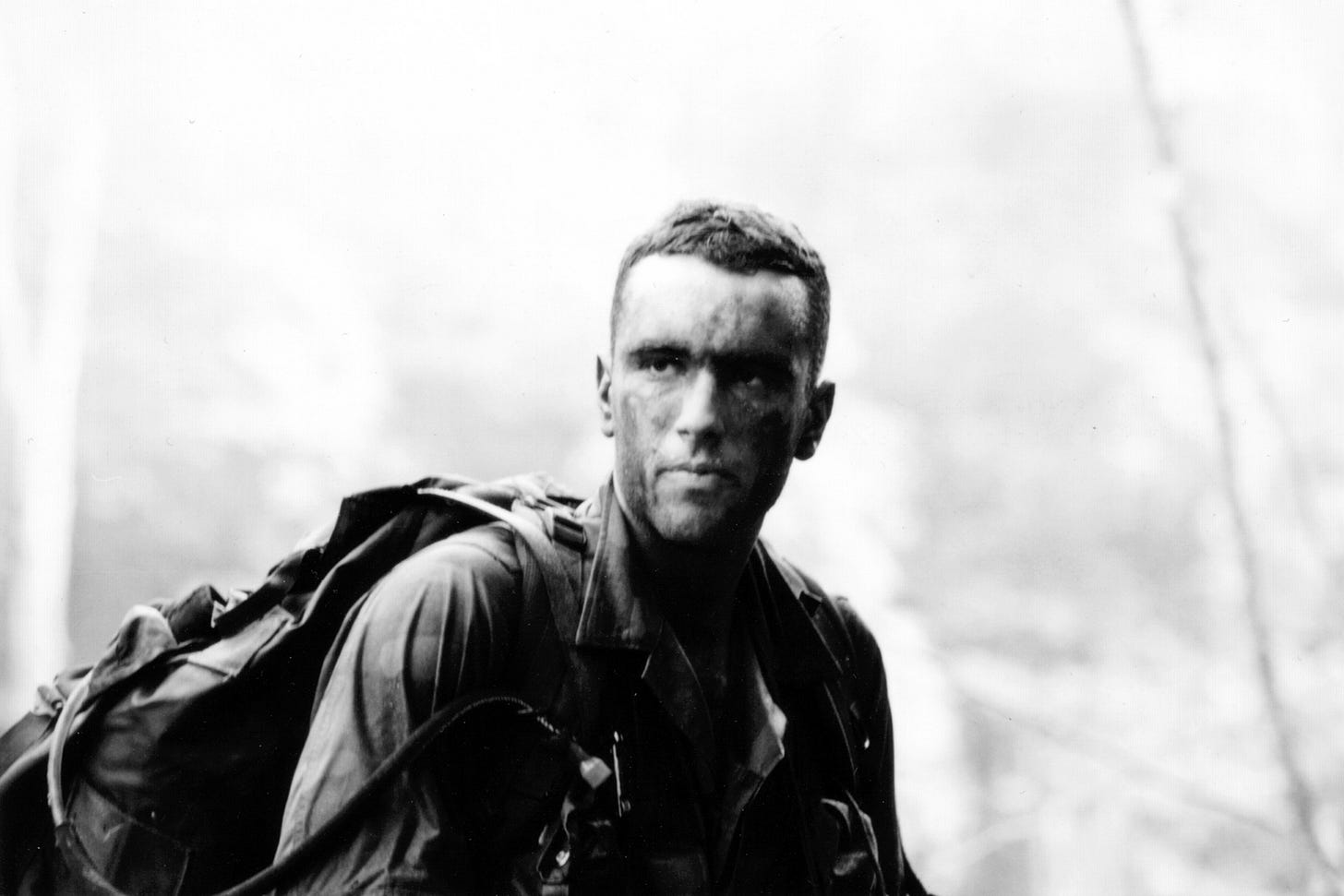TRANSITION INTERVIEW #13: Elliot Ackerman
Coming to Terms With Military Separation, Finding Writing, The Battle of Fallujah, and Remembering Doug Zembiec.
Elliot Ackerman is a writer whose work I’ve long admired. Both his fiction and non-fiction seem to capture the nuance and complexity of military service with unique honesty.
Before writing, Elliot served as a Marine Infantry officer, a Marine Special Operations officer, and later with the CIA. A veteran of Iraq and Afghanistan, he was awarded the Silver Star for his actions during the Battle of Fallujah. I hold deep respect for Elliot’s service, as well as his writing.
It was a privilege to have the following conversation:
When did writing become part of your life? Did you ever write anything on active duty?
Well, my mom is a writer, so I kind of grew up around it and I studied history and literature at school.
But I knew early on, I was going to the Marines. That was sort of my dream.
There's a joke. If you study history or English, there are two things you can do: 1.) teach history or English, or 2.) become an infantry officer.
Anyway, I've always been a big reader and I suspected I might write someday. But I wasn't really writing in the service. Once or twice, I had a false start or two, but never anything serious. I would maybe write a paragraph and then think this feels weird, and throw it away.
Doing the math, it must have been soon after you got out that you started writing your first book?
Yeah, that's right. After eight years, I felt fulfilled by the time I'd spent in the service. I was 31, and I'd realized that I was either going to stay where I was and do this type of work for the rest of my professional life, or I needed to pivot if I wanted to do something else.
And there were other things I wanted, though I wasn't yet certain it was writing. I didn't have a refined idea of what I wanted to do professionally.
At first, I had a job working in politics, but I knew that a job would last about a year.
On the side, I'd decided that I wanted to write something about the wars. I knew I didn't want it to be a memoir. I looked at the books that meant the most to me, the ones I was reading, and I knew I didn't want to write another "Hey bro, no shit, there we were" type of book.
Those weren't the books that really mattered to me.
I wanted to write something that might impact someone else the way that Jim Webb's Fields of Fire or Tim O'Brien's work, or Hemingway's had impacted me. So, it became clear that I wanted to write fiction.
Good Choice.
Ha! Thanks.
At that time, I didn't have a single thing to show in terms of writing. I didn't tell anyone I was working on a novel because I felt silly doing it. You know what I mean? Like telling someone, "I wanna dance!"… it felt a little ridiculous at first. I kept it a secret for a while.
About a year and a half later, I had a draft, and over that period of writing the book, I came to the conclusion that perhaps this is what I wanted to do. To be a writer over the long term.
And you still have a job at this time?
Yes. I did that year in politics. And when that ended, I ended up getting a White House Fellowship, so yes, I was sort of writing on the margins of my day job.
During that year in politics and the year in my fellowship, I met a variety of people. One was a retired publishing executive, Dick Snyder. He was an iconic and famously cantankerous publisher in the '70s, '80s, and into the '90s.
When I finished a draft of my first novel, I called and said, "Hey Dick, you know … I've written this book … and, well, would you read it?"
There was silence on the line, but he begrudgingly agreed. Later, he told me, "You know Elliot, the only reason I read your book was because I knew you'd been in the war, and I felt bad for you." (laughter)
Anyways, weeks go by, and the phone rings, and it's Dick, and he says, "Elliot… I finished your book, and I want to tell you, I don't think it's a piece of shit."
That was sort of my first big win.
So, long story short, Dick helped me get the manuscript to my current agent, PJ Mark. He is still my agent today and has become one of my greatest and dearest friends.
At the time, I remember sitting at my desk thinking, Wow, all these people told me publishing is really hard. This isn't so bad. Well … I'd soon learn.
Is this "Green on Blue"?
No, this book has never been published.
PJ sent the book out, a big and very aggressive submission. He really wanted to go for it. And I'm thinking, This is great!
Well, a week passes, two weeks pass, six weeks pass, so I pick up the phone and call PJ, and I'm like, "Hey, what's going on with the book?"
Well, he sends me his Excel spreadsheet of everyone and all their responses. No one wanted the book.
Anyway, reality really hit me. Particularly having left the military and finally feeling like I know what I wanted to do next.
I was pretty discouraged. The idea of writing another book felt so daunting. This first book was a very close-to-the-bone autobiographical work. It was a war novel, my attempt at Fields of Fire. I had by that time started a second book. I knuckled down and finished that book, which became my first. This was Green on Blue.
The advice I often give newer writers is that you have to do your best to separate your writing life from your publishing life. Otherwise, you'll go crazy.
What a great story. Thank God you had the foresight to keep writing.
I'd add one more thing if I can. Every writer I know has a story like that, and often we don't want to talk about our failures. But it's important to share those stories so people understand; it's part of the process. If you're going to write, you're going to get kicked in the teeth a lot. It's normal.
In "The Fifth Act", there's an early chapter that struck me where you're talking about your decision to leave the Marine Corps. You mention a feeling of betrayal and feeling a bit like you were quitting. Do you have any advice for someone going through some version of that today?
I think with these wars that just go on and on for twenty-plus years, every one of us who serves has to determine how we're going to leave the military and do so at peace with ourselves.
If we agree that you have to get out one day, that there's always going to be another deployment, then you have to design a way to leave that makes sense to you. That you're at peace with.
I don't have a simple answer on how to do that, but I think it helps to know that we all do it.
Figuring out what you want to invest in after that probably helps.
Any way you go about it, the decision to get out is fraught. The first step is probably understanding that it will be tough. Whatever words you want to put on it; guilt, FOMO, whatever it is, you might feel all of that, but one day, you have to leave.
It looks like you have kids? Personally, I knew the type of dad I wanted to be would mean that I only went on sixty helicopter raids in my career and not 600, and that was fine with me.
My mom has this saying, "The key to life is knowing that you can do anything you want, but you can't do it all at the same time."
That’s great. Everyone has to get out at some point.
Do you mind if I ask what was it like to know Doug Zembiec?
Oh man, you know, he was a great mentor, such a colorful guy.
I'll tell you, when I graduated from The Basic School at Quantico, I had just gotten orders to First Battalion, First Marines at Camp Pendleton in San Diego.
As you can imagine, almost every Lieutenant wants to go out to Pendleton in San Diego instead of Camp Lejeune in swampy North Carolina.
At the time, it was post-invasion / pre-insurgency Iraq, so no one really knew, if you went to Iraq, what you were going to do. Anyways, all of us lieutenants get our orders and our instructors tell us, "For twenty-four hours, if you want to switch orders with someone in your class, that's fine."
Well, there was a guy in my class who had orders to First Battalion, Eighth Marines - from San Diego - and he tells me he's willing to trade if I want.
I have this dark night of the soul, and I'm trying to figure out what to do. Do I go to Iraq? Or do I go to San Diego and do the MEU, which, at that time, was like the coolest thing you can do in the Marines.
I go to this one captain, and I ask him for advice, and he tells me, "Elliot, what the fuck do you want to go to Iraq for? All you're going to do in Iraq is peacekeeping duty. The MEU has been, and always will be, the cutting edge of the Marine Corps."
I'm like, okay. Then I went to the pay phone in the barracks and called Doug.
I say, "Hey, Sir…," and I give him my explanation over the phone, and I can remember him on the other end of the line saying, "Uh huh…. Uh-huh…. Uh-huh"
I finish explaining and ask, "What do you think I should do, sir?"
He says, "Let me ask you something. You go to that MEU, you gonna carry live rounds every day?"
I answer, "I don't know, I guess not every day."
And he says, "If you go to Iraq, you gonna be carrying live rounds every day?"
"I guess I will."
"Well …" he says. "What do you think you should do, Marine?"
That's great (laughter). I love that. I love it when someone has sort of an aura reputation, and then you hear from a source, and it rings true. Or maybe it's just painful when the opposite is true.
He had a way, man. Sometimes I would call him, you know, if I'd had sort of a shit day. If I was feeling pissy about something at work …
By the time I would get off the phone with him, I'd be ready to punch through a brick wall or sing the Marine Corps hymn or something. I would be so amped.
He had such clarity about who he was, what he was about, and what all of us were doing.
That's amazing. Thank God for people like that.
I've not read all your books, but a few, and I'm curious; in some, it's fairly obvious how you would have arrived at the topic, given your military experience, but in others, less so. What's required for an idea to make its way to the page?
Well, if an idea won't go away, those are the ones I'll usually start working on.
You start with a couple of key characters and get two or three pages. I'll often do that in a long hand.
Sometimes though, I'll be forty, fifty pages in and realize, this isn't a novel.
But you're right. I have books that are very much "war books," but others where I might use war as a backdrop for other subjects and themes.
We're jumping around a lot, but I wanted to ask you about transitioning from the Infantry to Marine Special Operations.
When you were in Fallujah, that was with the Infantry?
Yes. That was the deployment I mentioned earlier, right out of The Basic School, my first.
What was that like? Did you know you were operating in what would become somewhat historic? What we now consider some of the most intense urban combat of the last hundred years?
No, not really. One day, my company commander pulled me and the other Lieutenant left in our company aside. We'd been chewed up pretty bad at this point; one of the lieutenants in my company was killed and another was hurt pretty bad.
He says, "You know, you two are both the luckiest and the unluckiest lieutenants I've ever met." He says, "You're the luckiest because, right out of the gate, you're part of the biggest urban fight the Marine Corps has been in since Hue City. And you're the unluckiest because everything you ever do in the Marine Corps after this will pale in comparison."
He was right, but with one caveat. I was never in a fight as big as Fallujah; day after day, moving through the city with your platoon, watching your guys get hurt, and trying to hold it all together.
But the caveat is that the time I spent with what became Second Raiders was very different, but for me, equally amazing and interesting.
Incredible guys. I'm super grateful and proud I was able to be part of that community.
Our team was the first to do the Afghan Commando mission. Looking back, that's a whole chapter in Marine Corps history. I just took my son to the Marine Corps Museum. He wanted to see their new Global War on Terror section. It's cool to see our old uniforms up in the display cases, including Raiders wearing the Afghan Commando patch.
I know you've written some current non-fiction, magazine articles related to foreign policy and that type of thing. What do you hope the next administration gets right regarding foreign policy?
I think the single greatest foreign policy challenge the United States faces is our own internal dysfunction. If we can get our own house in order - and we don't have to agree on everything - but if we can at least get our foreign policy to a place where our differences stop at our shores, we'll be okay.
If we could get back to that, I think we could figure out our challenges, whether that's China, Iran, North Korea, or the Middle East. But our internal divisions hamstring us in concerning ways.
The other day, I came across John McCain's concession speech from 2008. It was respectful and professional, delivered with such class; I'm having a hard time imagining that speech delivered today.
I'll ask you one more if you don't mind. Any advice you have for vets that might want to create art or work in the creative space?
Sure. You just have to do it.
I credit a lot of my success to being willing to show up every day. A relentless degree of showing up.
The good news is, as vets, we kind of know this, sometimes I joke that being a Marine was great preparation for being a writer. So much of it is sitting down, doing the time, and suffering - being a little bit miserable creatively and figuring stuff out.
It's like the intellectual equivalent of sitting in your hooch; it's 40 degrees and raining, and you have to sit there for a week.
If you show up and you're faithful to your craft, good things often happen.
Elliot, thank you for doing this. And thank you for the work you've done to strengthen the Veteran community.








